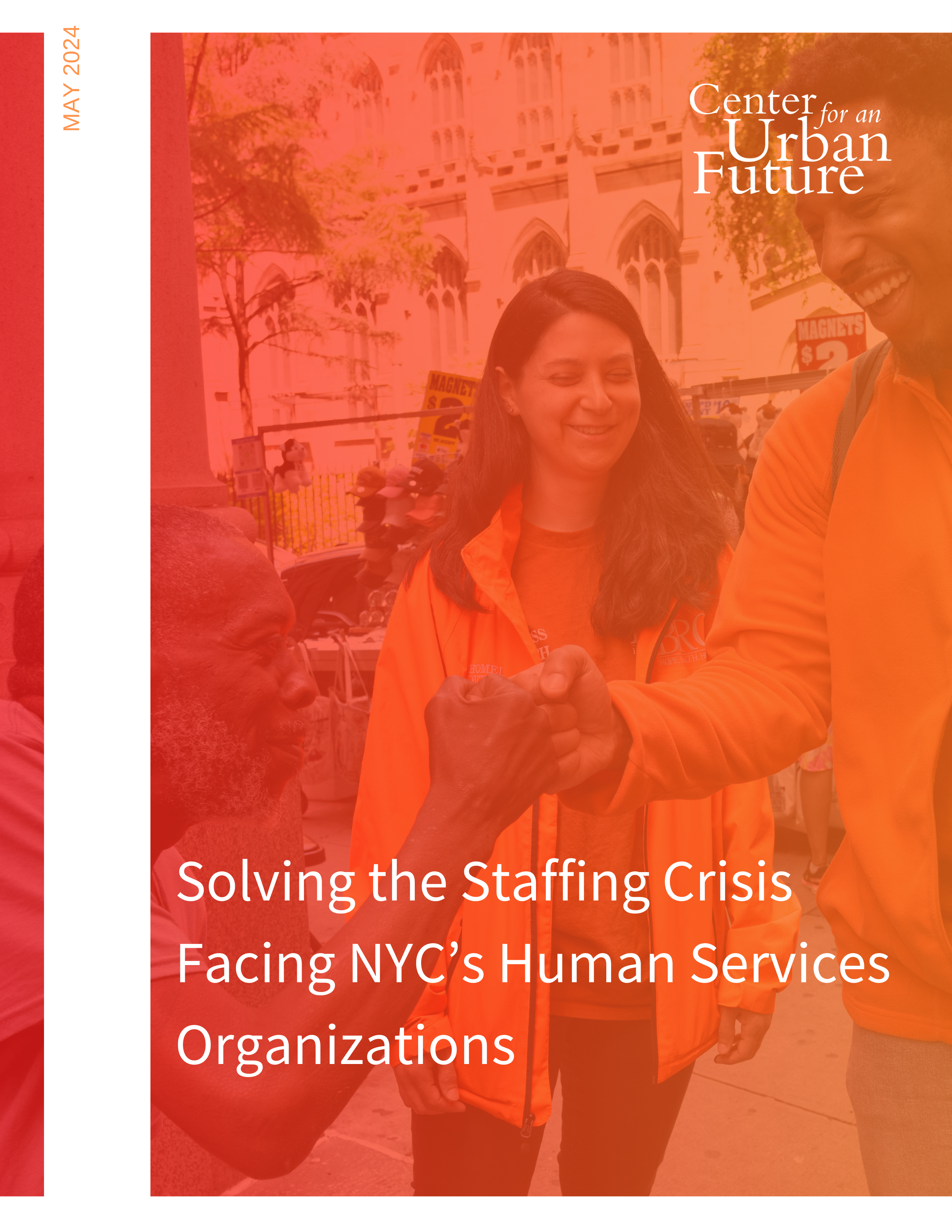Recommendations: How to Reduce Administrative Burdens on NYC’s Nonprofits and Strengthen the Sector Long-term
There are eight concrete steps policymakers can take to ease administrative burdens on New York City’s human services sector. These measures are low-hanging fruit with the potential to save a massive amount of staff time and taxpayer dollars, offering nonprofits urgently needed relief.
1. Commit to common sense reforms that eliminate or reduce the city’s most maddening contract requirements for nonprofits. While the city’s nonprofit contracting process is rife with bureaucratic challenges, there are a handful of especially egregious and unnecessary requirements imposed on nonprofits that could be reduced or eliminated without compromising accountability. The Adams administration should commit to reforming at least a half dozen of the most maddening contracting requirements by the end of 2023. Doing so would provide financial relief to struggling nonprofits and lead to improvements in service delivery, and it would not require any significant new funding commitment.
2. Ensure that efforts to revamp the state’s contracting portal include reforms that address unnecessary burdens on nonprofits. The Hochul administration is planning to roll out a new contracting portal to replace Grants Gateway. As the State works to do so, it is critical that officials remove some of the duplicative and needlessly burdensome requirements that are part of Grants Gateway and address longstanding problems that have drained the resources of nonprofits. To ensure that this happens, the state leaders building out this new system should ensure nonprofit leaders have ample opportunities to make recommendations and comment on early iterations of the new system.
3. Ensure all government agencies are using a digital procurement platform, as well as the same document standards. Mayor Adams and the Mayor’s Office of Contract Services (MOCS) should mandate that every city agency use PASSPort and ensure staff are trained to do so. MOCS should work with the newly established Mayor’s Office for Nonprofit Services to develop a set of standards for uploading common organizational documents such as board directories, insurance documents, personnel policies, and conflict of interest information. Likewise, Governor Hochul should mandate that every state agency adopt the portal replacing Grants Gateway, along with a common set of document standards. Both digital platforms should evolve to include a status tracker to improve transparency and help hold agencies accountable for timely contract registration.
4. Introduce a documents vault to PASSPort. As MOCS continues to refine the PASSPort platform, it should consider introducing a feature similar to the documents vault that was once widely used on HHS Accelerator. It would allow nonprofit staff to upload one set of basic contract documents—such as general liability information and board of directors lists—in one place where agency staff and auditors could then easily access them. By relaunching this secure digital storage system—and requiring agency staffers to use it—MOCS can help eliminate thousands of hours that nonprofit staff currently spend emailing and uploading the same documents for each individual contract and audit.
5. Eliminate manual double data entry by importing data via Excel templates and build bridges between reporting systems long-term. New York City’s Human Resources Administration (HRA) allows nonprofits to provide program data via Excel files for batch import. Other agencies should follow suit, enabling nonprofits to generate reports from their own internal reporting systems for easy upload—rather than manually entering the data field by field in agency systems, saving an enormous amount of time. Over the longer term, policymakers should invest in data bridges and the development of APIs, so that nonprofits can import and export data into and out of government systems. Funding to build effective APIs would allow nonprofits and government agencies to maintain databases that meet their unique needs while facilitating secure and nearly instantaneous communication among them.
6. Build a digital, standardized vouchering portal and enforce compliance with MOCS’s initiative to expedite repayment. A digital platform for submitting vouchers and tracking payments—potentially as a feature of PASSPort or Grants Gateway—would standardize and dramatically speed up the reimbursement process. All relevant government agencies should be required to use the platform and comply with the reimbursement guidelines laid out by MOCS in January 2021. A sample of expenses should be audited after—not before—payment has been issued; scrutiny should correlate with the amount of the expense; and widely available technology should be adopted to automate much of the review process.
7. Reduce the number of annual audits nonprofits are subjected to and standardize the process where possible. If federal auditing guidelines require testing 15 to 20 percent of contracts, there is no reason state and city agencies should be auditing 100 percent of a nonprofit’s contracts. Policymakers should significantly decrease the volume of auditing nonprofits are subjected to on an annual basis and standardize auditing standards as much as possible. In addition, officials should make organizational documents available to auditors via PASSPort and Grants Gateway, so that nonprofit staff are no longer obligated to print or email thousands of pages of documents that already live in government systems.
8. Pare down discretionary funding application and reporting requirements. The city council, MOCS, and the New York City Comptroller’s Office should work together to simplify and standardize the application and reporting process for discretionary funding from the City Council. Accessible, flexible grants are critical to nurturing New York City’s smallest, most vulnerable nonprofits, and growing the sector long-term.
As New York state and city anticipate squeezed budgets, it’s imperative to help government partners and agencies operate as efficiently as possible. If policymakers acted on these reforms, they could help struggling nonprofits redirect sorely needed resources to providing direct services. By reducing the tens of thousands of hours nonprofit staff currently spend uploading identical contract documents, manually entering data, hunting for hardcopy voucher receipts, and more, leaders could redirect a tremendous amount of energy and talent toward serving New Yorkers in need.






